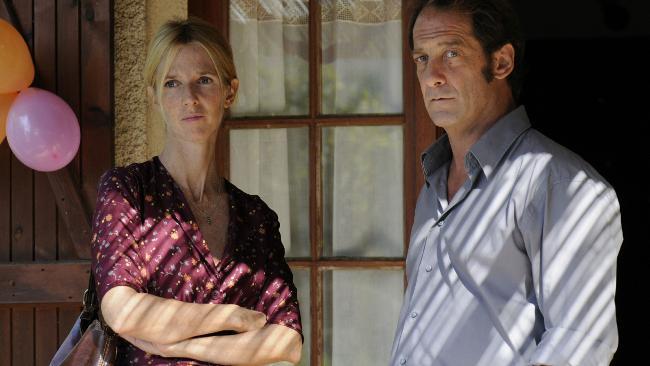An affair to remember
REVIEWERS aren't supposed to pay much attention to film production notes: all that studio hype, with directors' messages and interviews with cast members.

REVIEWERS aren't supposed to pay much attention to film production notes: all that studio hype, with directors' messages and factitious interviews with cast members.
But what if I hadn't read the notes for Mademoiselle Chambon, this beautiful new film from France? I may never have known that Sandrine Kiberlain and Vincent Lindon, who play the lovers, were once lovers in real life and, sadly, are lovers no more.
Should this influence our estimation of their performances, vital and touching as they are? I can only say that watching them on screen, one would never imagine a cloud had passed between them.
The director, Stephane Brize, is at pains to emphasise the ordinariness of his characters. For long stretches we watch them at close quarters, doing nothing in particular. Mademoiselle Chambon (her first name is Veronique, though we never hear it spoken, not even by her lover) is a schoolteacher in a French provincial town. She lives alone. For years she has been moving from one place to another, restless and unhappy. We wonder about some broken marriage, some past misfortune, but are never told about it.
I can't remember a film in which there was so little meaningful conversation between the two main characters, so much revealed with looks and gestures.
Jean (Lindon) is a bricklayer, happily married to Anne-Marie (Aure Atika), who works on the production line in a printing factory. They have a young son and we take them for an ordinary working-class family, a point driven home by extended shots of Jean working on building sites.
There's always a fascination in watching skilled workmen ply their trade and, as I discovered from my production notes, Lindon spent some time practising the brickie's craft. It is impossible to dislike a man who embodies the dignity of honest labour, even when he seems a little too refined to be to be a brickie or, as Stephen Potter would have said, a little too clean about the fingernails (no offence to brickies intended).
Are there hidden depths in Jean? It would seem so. At Mademoiselle Chambon's invitation, he agrees to talk to her class at school about what it means to be a builder. And the scene touches us because, while we sense that Jean isn't comfortable with words, he's making an effort to communicate his enthusiasm for walls and breezeblocks and concrete foundations. As a favour he repairs a window in Mademoiselle Chambon's apartment -- another operation we observe at length -- and the two form an attachment: at first polite, reserved, scrupulously proper, and deepening as the film goes on.
The source is a novel by Eric Holder, freely adapted by Brize and Florence Vignon, and the result is a deeply sensitive and engaging film. With evident pride, as I read in my production notes, Brize has described it as "infinitely sentimental", and I suppose he means sentimental in the best sense, dealing with the purest and most intense emotions without mawkishness or artifice.
We see the characters as they are and accept them. I remember thinking the same about Marty, Hollywood's first film about love and the working man, in which Ernest Borgnine played a butcher, a much less handsome guy than Jean the brickie.
It's a simple story and one suspects that the occasional plot twists, satisfying as they are, have been inserted to give a little more bite to the unruffled progress of the love affair. Jean has to care for his invalid father (Jean-Marc Thibault) and there's an odd scene in which they visit a funeral parlour to choose a coffin for the old man. The intimations of mortality feel a little too oppressive here, and Anne Houdy's cameo as a shrewd-eyed undertaker lady, full of calculating insincerities, is the kind of comic diversion that really belongs in another film.
We can believe in these lovers, though exactly what they see in each other is hard to say. Perhaps this is one of the mysteries of love that Brize wants us to contemplate. Physical attraction seems to be the least of their motivations. Does Veronique sense something greater in Jean than his down-to-earth manner would suggest? We take her to be his intellectual superior and, when we discover (casually enough) that her sister has been appointed a judge, we sense an underlying social divide as well.
If Jean were more comfortably middle class, Mademoiselle Chambon might have been a French version of Brief Encounter. Surely it's no more than coincidence that both films have crucial scenes on railway platforms. Will mademoiselle board that train? (Some will hope she does, some will not.) Will Jean step up to the platform?
The performances can hardly be faulted. Kiberlain is especially moving as Veronique. She has one of those haggard, eerily beautiful faces that would never make her a Hollywood star and Brize does everything possible to emphasise her insecurity, her wariness, her fragility, none of them glamorous qualities.
But what depths of longing and tenderness she conveys in the merest glance! As for Lindon, he makes Jean's mild stolidity seem strangely endearing. With some effort I was able to ignore the fact he looks remarkably like Bryan Brown (as he did when I saw last him in Mes amis, mes amours). In this company, Atika faces stiff competition as Anne-Marie but manages to move us deeply as the loyal wife, loving and uncomprehending as her marriage begins to unravel.
For all its tact, its delicacy, its sweetness, Mademoiselle Chambon bothered me in one aspect. It's this business with the music. Veronique is a violinist. It's years since she played and we wonder why she gave it up. A failed concert career? Some buried family trauma? Typically, we aren't told. But then, reluctantly, she agrees to play for Jean, who has listened to one of her CDs and is enchanted by the sound.
The music stirs some hidden spring of feeling buried in his workman's soul. It's as if Brize is saying: Jean may be an ordinary brickie, but see how music can transform him into a sensitive and understanding lover, worthy of someone as refined and intelligent as Mademoiselle Chambon.
Solo violin recitals are always the art-house weapon of choice when our finer feelings need stimulation. Is Mademoiselle Chambon a film about the power of love or the power of music? It bothers me that I should have to ask the question. Most of the film is so good that we hardly care about the answer. But I think it would have been a better film without that solo violin.


